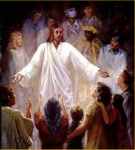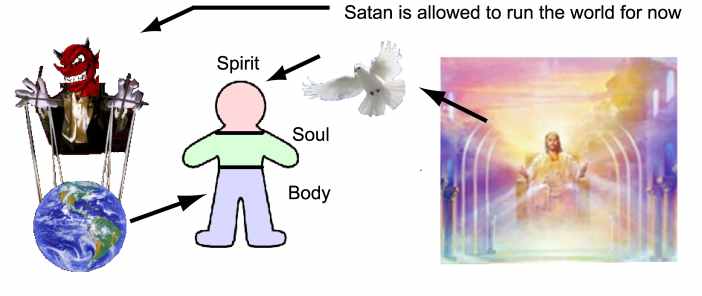


 |
|
Christianity was supposed to be about becoming like Jesus. |  |
||
| We went in the wrong direction. |
| |
|
How do you walk in the Spirit? |
|
Flesh |
What is walking in the Spirit? |
Spirit |
||||
| Old nature and desires | New life in Christ | |||||
 |
But I say, Through the instrumentality of the Spirit habitually order your manner of life, and you will in no wise execute the passionate desire of the evil nature, for the evil nature constantly has a strong desire to suppress the Spirit, and the Spirit constantly has a strong desire to suppress the evil nature. And these are entrenched in an attitude of mutual opposition to one another so that you may not do the things that you desire to do. - Galatians 5:16-17 (Wuest) |  |
||||
| Man's fall and God's salvation | |||

|
Adam and Eve
|
||
 |
The Plan
|
||
 |
The Work of the
Spirit
|
||
 |
The Problem
|
||
| A key to understanding the two ways of living the Christian life is to understand that "works" refer to things we do and "fruit" refers to what is done through us. The flesh is about "self" and the Spirit is about love (which is selflessness). | |||
| Works of the flesh | |||
|
|
Now the works of the flesh are manifest, which are these; Adultery, fornication, uncleanness, lasciviousness, idolatry, witchcraft, hatred, variance, emulations, wrath, strife, seditions, heresies, envyings, murders, drunkenness, revellings, and such like: of the which I tell you before, as I have also told you in time past, that they which do such things shall not inherit the kingdom of God. - Galatians 5:19-21 | ||
| Fruits of the Spirit | |||
|
|
But the fruit of the Spirit is love, joy, peace, longsuffering, gentleness, goodness, faith, meekness, temperance: against such there is no law. - Galatians 5:22-23 | ||
| "Christian" examples
of works of the flesh
|
||
 |
Sensual indulgences
|
|
 |
Religiosity
|
|
 |
Divisions, heresies, and
factions
|
|
 |
Jealousy, envy and greed
|
|
 |
Selfishness
|
|
 |
Laziness
|
|
 |
Zealousness
|
|
 |
Routine
|
|
There is a battle over the soul of each Christian |
|||
| God wants us to walk by His Spirit and become more and more like Jesus. Satan wants us to plunge into his world of the flesh and distract us from Jesus. | |||

|
|||
|
When a person trusts in Jesus, God sends His Holy Spirit to give that person a new birth (born again). This is a living connection to Jesus (as illustrated in the description of the vine and the branches - John 15). The power of the flesh is broken, but Satan still seeks ways to draw Christians away from their Savior and back into the patterns of the world and the flesh. |
|||
|
James tells us that to be a friend of the world is to be an enemy of God. |
|||
|
Thus, also, as for you, you be constantly counting upon the fact that, on the one hand, you are those who have been separated from the sinful nature, and, on the other, that you are living ones with respect to God in Christ Jesus. Stop therefore allowing the sinful nature to reign as king in your mortal body with a view to obeying it in its passionate cravings. Moreover, stop putting your members at the disposal of the sinful nature as weapons of unrighteousness, but by a once-for-all act and at once, put yourselves at the disposal of God as those who are actively alive out from among the dead, and put your members as weapons of righteousness at the disposal of God, for the sinful nature will not exercise lordship over you, for you are not under law but under grace. - Romans 6:11-14 Wuest |
|||
| So then, brethren, we are those under obligation, not to the sinful nature to live habitually under the dominion of the sinful nature. For, assuming that you are living habitually under the dominion of the sinful nature, you are on the way to dying. But, assuming that by the Spirit you are habitually putting to death the deeds of the body, you will live. - Romans 8:12-1 Wuest | |||
| There is a "war" going on inside each Christian. Satan is trying to find a way to cripple Christians by enticing, deceiving, and luring them into the flesh. Jesus "stands at the door and knocks". We have to choose. We have to make a real and decided submission to God and participate in "putting to death the works of the flesh". | |||
|
Christianity has to be a way of living and not just a weekly habit. |
|||
| To walk by the Spirit, we have to want to walk by the Spirit. Our "wanting" has to be more than acquiescence. Our desire has to be similar to "hungering and thirsting for righteousness". The tepid, uncertain, and half-hearted are crippled because, like the rich young ruler, their fears, divided loyalties, and attachments to fleshly comforts keep them from being able to surrender everything to God. | |||
| Surrender to God | |||
|
|
Many people are uncertain of their salvation.
Often their denomination offers assurance that they are Christian because
of the criteria they have met such as being baptized, being a member of
the church, having been confirmed, or having really repented.
Being a Christian is a simple as trusting in Jesus. Assurance comes directly from our Savior and through His Spirit as we mature and grow into the image of Christ. Most Christians never even begin this process. And that he died for all, that they which live should not henceforth live unto themselves, but unto him which died for them, and rose again. - 2 Corinthians 5:15 |
||
| Death of flesh | |||
|
|
Putting something to death means acting to cut-off
those things that give life.
A "dragon" my be killed by cutting of a supply of blood, but the flesh is "killed" by cutting off what gives it life such as attention, provision, time, and association. One has to be careful to do this by the Spirit. It is not uncommon for someone to use their own strength (flesh) just to exchange one manifestation of the flesh for another. |
||
| Jesus is our example of walking by the Spirit | ||
 |
And He was saying to all, Assuming that anyone desires to come after me as a follower of mine, let him disregard his own interests, and let him at once and once for all pick up and carry his cross day after day, and let him take the same road with me that I take as a habit of life. - Luke 9:23 (Wuest) | |
| Christian example of putting to "death" a work of the flesh | ||
 |
Consider a man that was active in his
church, busy with various committees, and led what he considered an exemplary
life. As the years passed, he found himself more and more at the center of
church activity. This man was forceful in requiring that his children obey
the requirements of his church. His children felt that the church
requirements were excessive and became estranged from the man over the
years. Now the man is elderly and finds that he is not the center of
church activity and that those to whom he supposed he was ministering have
no more use for him.
In the solitude and quiet of his home, he begins to reflect on his life and life choices. He begins to consider that his approach to his family was not what it should have been. Knowing that his years are now short, he begins to see that much of his church activity was just another walk in the flesh. He sought to keep his family from the dangers of drugs, sex, and rock and roll when all the time he himself had been in the flesh and quenching the work of the Holy Spirit. In his regret and sorrow, he tries to reach out to his children and meets the resistance of those who have been chastised over the years and learned to turn a deaf ear to anything sounding "religious". The man persists first by acknowledging his failures and then apologizing. In the light of truth and even at the eleventh hour, relationships can be repaired. |
|
 |
Path of truth
|
|
 |
Is it possible?
|
|
 |
Being convicted
|
|

|
Putting to death
|
|

|
Surrender and humility
|
|
 |
Making a new start
|
|
 |
Seeking to walk in the Spirit
|
|
What stops us from walking in the Spirit |
|||
|
|
When John the Baptist was in prison he sent word to ask Jesus if he was the Messiah. This seems a little strange because in referring to John, Jesus said that there was none born greater. We see in John an example of faith without the indwelling ministry of the Holy Spirit. Even without the indwelling Spirit John knew that Jesus must increase while he (John) must decrease. Today Christians have the indwelling Holy Spirit yet abound in self and selfishness which quenches the Spirit. | ||
| Most of us come to Christianity either as unsaved or having been raised in a particular denomination. Those who have been raised as Christians have a more difficult time considering the possibility that they walk in the flesh or are not already walking by the Spirit. For the Christian who seeks to follow Jesus, he must first reflect on all that is in him that resists this course. | |||

|
|||
|
We do not have as clear a choice between the world and the flesh and the "narrow gate" as we think. |
|||
| The rich young ruler | |||
|
|
Even poor people today live in more comfort than most kings of the past. The rich young ruler wanted to know what he had to do. Jesus told him about the law. The young man felt he had kept the law. Jesus then told him that to be perfect, he should sell all he owned and give it to the poor and follow him. We live in an era of unprecedented prosperity. Like the rich young ruler, we find it difficult to let go of all that we have. | ||
| Social indoctrination | |||
|
|
Almost everyone on earth is put through some form of social indoctrination in the name of education. The primary purpose is homogenization. We are to first look at others to see what we should do. It is very difficult for someone raised in such a system of indoctrination to be shed of its influences. | ||
| Religious indoctrination | |||

|
Most Christian denominations have classes and instruction for young people. This instruction is often well intentioned, but designed mostly to perpetuate the denomination and often falls short of helping children to learn truth, learn to apply Christianity to run their lives, or learn to become like Jesus. It is insidious because people raised in it often think they are already walking by the Spirit. | ||
| Economic indoctrination | |||

|
Most people think they need to go to college to get a good job so they can earn enough money to buy a nice house and raise their children so that they do the same. Not only is this not the only path in life, but it is dangerous in that it weaves so tightly to the world those who follow it. People see the system as their only hope and like the young ruler cannot let go of that which ensnares them. | ||
| Media indoctrination | |||

|
Our source of entertainment and information saturates us with patterns of indoctrination of which we are scarcely aware. We are shaped to follow certain patterns. We are guided to accept certain ideas. We are instructed as to what is and isn't acceptable. | ||
| Seeking truth | |||

|
Those who would walk by the Spirit must first seek truth. As our eyes are opened to our attachments to the world and the flesh, we need to consider what needs to be changed. The biggest obstacle to overcome is the idea that everything we are already doing is right. If we see no need for change, there will be no change. The only hope we have in escaping Satan's indoctrination is to seek and recognize truth. | ||
| Self-surgery | |||

|
As we identify those things in us and those things to which we are attached that need to be changed, the question becomes how do we do it. We ask the Holy Spirit to change us. We have an active role to play. Galatians 5:16 refers to how we "habitually order our manner of life". If our life has been ordered by the world and the flesh, we need to take control and by the Spirit make changes so that a new "order" is introduced. | ||
| Things to consider when reflecting on how woven into the world we are and how much we follow the flesh. | ||||
| There a few things that will make someone more angry than suggesting that what he is doing is wrong. However, while many people make a good living in Christianity by telling everyone what they want to hear, it is incumbent on those that would follow Jesus to seek the truth. This means that even if we examine closely cherished activities, we should do so without emotional defensiveness but be open to looking at them in truth. | ||||
| Birth control | ||||
 |
The Bible tells us that children are from the Lord. Using birth control is a little like telling God, "Go way, we have our own plans." People deceive themselves by thinking that they would not be able to afford any more children, when they either want to use their money for themselves or just don't trust that God will provide for them. As families diminish, we are all made poorer. | |||
| College | ||||
 |
It is difficult to think of any other single institution that is so successful in advancing the state religion of secularism (the worship of man in general and self in particular). Graduates often have a strong emotional feeling for the organization they feel "taught" them when the institution is just claiming credit for the learning they did. The experience often creates deep seated superiority, a sense of entitlement, and an intense perspective that the world should to be controlled. | |||
| Corporations | ||||
 |
If you run a family business, you want to take care of your customers. If you work for a small corporation, you want to take care of your boss. If you work for a large corporation, you want to be able to carve out a comfortable nest. As the free market is taken over by ever increasingly larger economic collectives, we are drawn further into the grip of the world. | |||
| 401K | ||||
 |
Our concern about social security, retirement, or the future in general is often assured by our faith. It is not often that our faith in God is stronger than our faith in out financial status or expectation. It is an interesting question to ask, "What would be more alarming to hear, that you had lost your salvation or that your savings had been lost?" | |||
| Insurance | ||||
 |
Many people feel that "nothing can be left to chance". This is an odd perspective for a Christian who is supposed to trust in Jesus. Christians are supposed to live by faith. If we obtain "assurance" from our insurance, we lose the opportunity to witness God provide for us, we are unavailable to receive loving assistance from our brothers and sisters in Christ, and we insulate ourselves from those things that God might bring into our lives that would draw us closer to Him. | |||
| Living together | ||||
 |
Most people that call themselves Christian live together before they get married. This shows a low regard for the institution of marriage itself. It is often a reflection of lives that are lived for self and with little regard for building a family. | |||
| Daycare | ||||
 |
A two income family can produce greater wealth. The Bible refers to the deceitfulness of riches. One example of this is thinking that putting a baby in a car seat on the way to daycare is being responsible. Another example is thinking that the money you earn will build a better future for the child than would your raising him yourself. | |||
| Government | ||||
 |
The worldly manifestation of Satan's power on earth is government. We look to government as our protector, provider, and source of security. Satan wants us to think that God is illusionary and that government power is tangible. | |||
| Kids in school | ||||
 |
Public school is harmful to children. It produces socially dependant children, promotes sexual profligacy, insufferable tedium, and indoctrination with the values of the state. Women are not so stupid as to be unable to raise the children God gave them. Raising and teaching your own children builds a family. Turning them over to the state is a sad abandonment of the job God gave you. | |||
| To walk in the Spirit is to habitually order our life as God would have us live it. What are the habits of our life? Do we constantly seek to make changes so that we are more able to live for the Lord? Or do we make excuses saying that we already give to the church, have to get a good education for our two kids, or have to have two incomes to afford a good neighborhood so that we can remain comfortable? |
|
"Ordering" our inner life |
||||||
 |
Those things we do that are visible
and noticeable stem from what is inside. The Bible says, "Out
of the fullness of the heart the mouth speaks". Our words, like our
actions, only reflect what is in our heart.
To really put to death the works of the flesh, we have to address those internal configurations that reflexively make us resonate with the world and the systems of the world Satan has designed. |
|||||
|
A Christian example of "ordering" the heart. |
||||||
 |
A man may reflect on why he doesn't seem
to have many friends. He may review those conversations he has had with other
Christians and speculate if one problem may be that he talks too much
about himself.
He may try to ask others about themselves and draw them out rather than assume they would be interested in him. The man may find "success" in increasing the number of people that are interested in conversing with him. However, he still seems not to have any more "friends". |
|||||
 |
The man has only done as much as a good salesman such as showing an interest in the customer. What needs to change is he has to have a real interest in others, not just getting others to be interested in him. The key to this level of interest is to have less of an interest in self so that he can have a real interest in others. | |||||
 |
One way to reduce our preoccupation with
ourselves is to reflect on how our state as Christians can allow us to be
free from the concerns of self
Paul writes in Philippians that he is drawn in two directions, whether to die and be with the Lord or to remain and minister to the Philippians. He concludes it is better to remain to help the Philippians. This ambivalence about the interests of self is a key perspective. It is sometimes achieved by those who consider suicide or by those who are in combat and expect to be killed. |
|||||
 |
For the Christian who is not under such extreme circumstances as to completely abandon the interests of self, there is an alternative. We can surrender ourselves to the Lord and allow His Spirit to work in us to remove our selfish concerns. We still have to participate in this process in that as we identify those reactions of self and selfishness in us, we need to acknowledge them and cry out to the Lord to remove them from us. | |||||
 |
In practice, most of us only make slow progress in ordering our hearts to be more useful to our Lord. We make sincere declarations of intent, yet still often find ourselves slipping back into old habits. Our Christian walk is not a failure, it is one of repetitions like the waves upon a shore. Over time the work of God in our hearts changes us to be a little more like Jesus every day. | |||||
 |
In the example of the friendless man, we may find that he has become more capable of real friendship, even if he now has trouble finding others who are able to reciprocate. However, even if he is unable to find those from whom he can derive deeper fellowship, he is now able to have real concern for others and even minister to them as much as they allow. | |||||
|
|